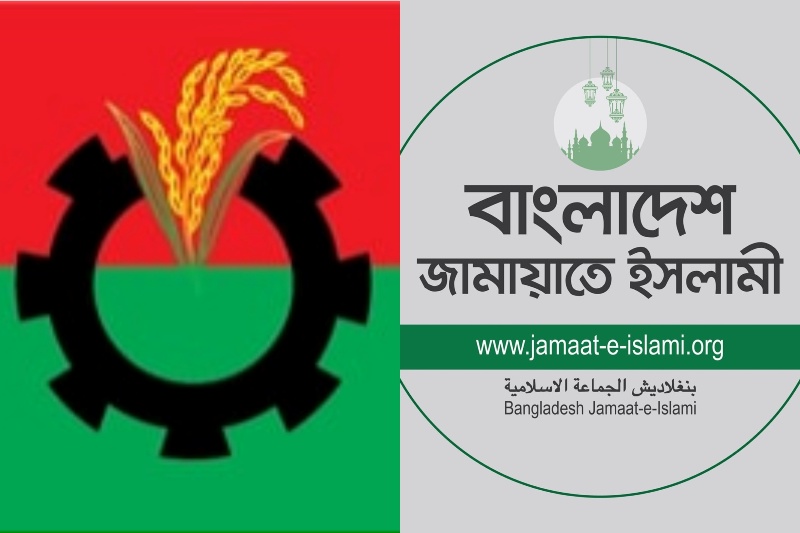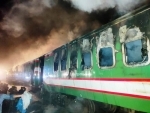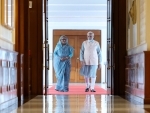Bangladesh
 BNP-Jamaat
BNP-Jamaat BNP-JEI (BD) Nexus: A Bangladeshi Curse
Dhaka, August 4: The US-led West has a proven track record of playing the game of brinkmanship around the world. The Islamic world has been the worst victim of Western meddling in their affairs. They bombed one’s economies to rubble, on fictitious grounds, paved the way for social unrest, and the rise of extremist forces. Their track record in effectively fighting terrorism is equally pathetic. The West offered safe sanctuary to extremist elements, who brought a bad name to Islam. “Saudi Arabia is more keen to fight terrorism than the Europeans,” the UAE’s foreign minister Sheikh Abdullah bin Zayed Al-Nahyan said in 2017.
Bangladesh is all set to be the latest victim of the Western double standard. The US and Europe are working overtime here to bring far-rightwing Bangladesh Jamaat-eIslami (BJEI) back into the electoral space. The Supreme Court of Bangladesh banned them from participating in elections in 2013 for upholding Sharia law over the country’s constitution. A six-member Election Exploratory Mission from the European Union (EU) met Jamaat leaders in Dhaka recently.
Reviving a monster
Bangladesh Jamaat is part of a Pakistan-headquartered violent, theocratic network responsible for atrocities on Christians, Hindus, Buddhists, and Ahmadi and Shia Muslims in South Asia. In Bangladesh, Jamaat acts as the nerve centre of extremism. They opposed the country’s independence movement in 1971. Along with its affiliates al-Badr and al-Shams, they acted as the militia for the Pakistani Army and massacred nearly three million Bengalis during the Liberation War. Many more million women were raped and tortured.
BJEI, formerly known as Jamaat-e-Islami Bangladesh, and its dreaded student front Islami Chhatra Shibir (ICS) has been founded and run with Pakistani support. They received substantial funding from Pakistan. Many or most of the top Jamaat leaders ran to Pakistan after Bangladesh was liberated in December 1971. They were reinstated in Bangladesh politics during the 15-year-long military rule between 1975 and 1990.
Military ruler Major General Ziaur Rahman (1977-1981) - suspected to be a mastermind of the killing of the father of the nation Bangabandhu Sheikh Mujibur Rahman of Awami League – was the pioneer in giving space to Jamaat and harming the secular, democratic fabric of Bangladesh. According to Swedish researcher Bertil Lintner, Ziaur Rahman revived the Jamaat to create a strong ideological force together with his own Bangladesh Nationalist Party (BNP). He restored the citizenship of a host of Jamaat leaders who were then living in Pakistan and, dropped the word “secular’ from the Preamble of the Bangladeshi Constitution.
The deadly religious pill introduced by Ziaur Rahman had since been a part of Bangladeshi politics. Ziaur Rahman allowed Jamaat to borrow new fundamentalist ideas from Pakistan. Military ruler H M Ershad (1983-1990) helped Jamaat spread its hardline Islam in the country. The seeds they sowed yielded results after democracy was restored. The BNP-Jamaat combine came to power in 1991 under the leadership of Ziaur Rahman’s widow and current BNP chief, Begum Khaleda Zia. Lintner had been a correspondent of the Far Eastern Economic Review and watched this episode closely.
From here onwards, Jamaat became unstoppable. There were waves of attacks on religious minorities particularly the largest minority group Hindus. The last of such deadly attacks took place in 2013, before the apex court banned them from electoral politics and the incumbent Prime Minister Sheikh Hasina (daughter of late Mujibur Rahman) of Awami League, came down heavily on Jamaat. Amnesty International recorded the torture of Shibir (Jamaat’s student wing) on minorities.
Jamaat’s terror network
Worst of all, Bangladesh became a hotbed of terrorist activities for nearly three decades between 1980 and 2008, when Hasina became Prime Minister. With support from military rulers (1975-1990) and, then as an ally of BNP, Jamaat did their best to destabilize Bangladesh and made the country a hot spot of cross-border terror. HuJI-B was founded in the late 1980s by the members of the Bangladeshi Mujahideen who took part in the US-sponsored jihad against the Soviet-sponsored government in Afghanistan. The outfit had strong links with Al-Qaida.
HuJI was given the task of annihilating secular-democratic voices represented by the Awami League. The grenade attack on Sheikh Hasina’s rally in August 2004, killing 24 and the bombing at Ramna Batamul in Dhaka during Bengali New Year celebrations in April 2001, were two most daring acts of HuJI done at the behest of Jamaat and its protector BNP. The grenade attack was aimed at Hasina. She miraculously survived it.
An even more hardline group, again a BJEI affiliate, Jamaat-ul-Mujahideen Bangladesh (JMB) came up in 1998 and added a new benchmark to terror. They were responsible for a series of bombings in August 2005 and targeted attacks, against prominent government officials, judges, and academicians, who were defending democracy and the rule of law.
By every means, the 2001-2006 BNP rule pushed Bangladesh on the verge of being declared a terrorist state. Dhaka openly gave shelter, arms and training to militant groups from India’s Northeast during that period. Jamaat, which was then holding important portfolios in Khaleda Zia’s cabinet, was the mastermind and the moneybag behind the whole operation. The alert Indian authorities raked up the issue in global security forums. In 2004, the Zia government was forced to confiscate 10 truckloads of arms which were headed for Northeast India.
Lessons from Pakistan
A lot changed in Bangladesh over the last 15 years. The country witnessed unprecedented infrastructure-building activity, including the Padma Bridge. The size of the economy grew by nearly five times. Per-capita income grew at a faster pace than ever. From a hotbed of terrorist activities, Dhaka is today an inspiration for cooperative development in South Asia. It is steadfastly working with India to strengthen economic fundamentals in Bhutan-Bangladesh-India-Nepal (BBIN) region and extended help to Sri Lanka in its hard times. Revival of Jamaat is potent to dislodge the growth momentum.
Back in the 1980s, the US gave resources to Pakistan to raise Mujahideen or Jihadi forces in Afghanistan to bring down the Soviet-backed Mohammad Najibullah Ahmadzai government in Kabul. Cheap recruits from Pakistan and Bangladesh joined Afghans. The jihad gave rise to the Taliban, who killed Najibullah mercilessly in 1992. Within a decade, the US went to war with Afghan Taliban. Over the next 20 years, Afghanistan suffered huge human tragedies. In the end, America left Kabul to the Taliban.
Meanwhile, the offshoots of the Jihad had spread into Pakistan and Bangladesh. Hasina bottled them up in Bangladesh but Pakistan couldn’t. The suicide bombers of Pakistani Taliban are giving nightmares to Islamabad.



